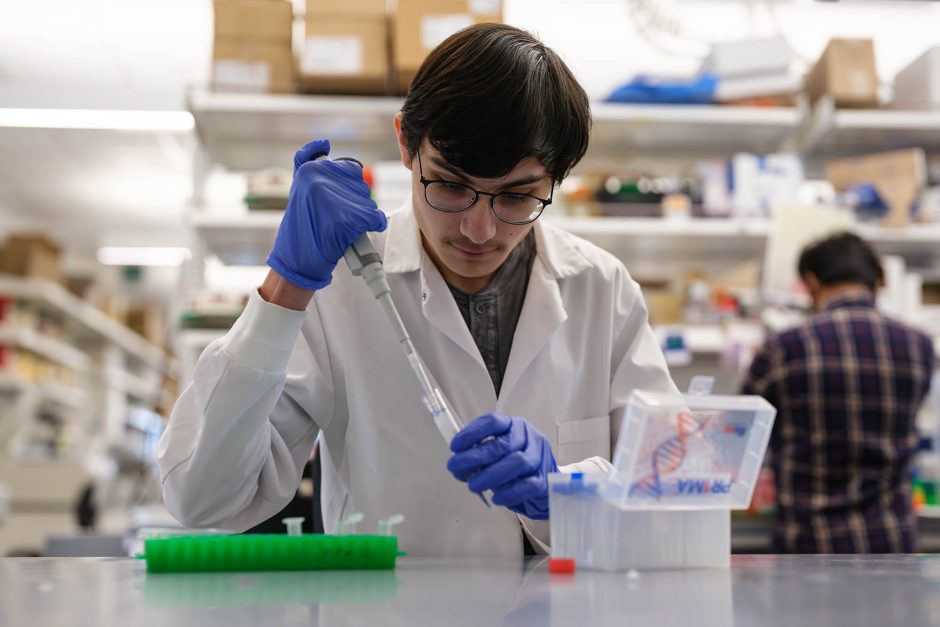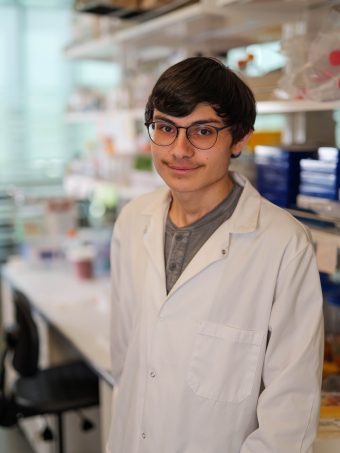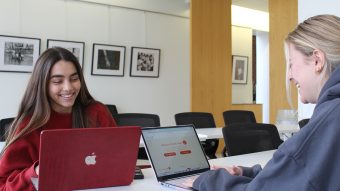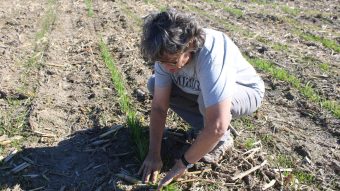
April 14, 2025
Contact: Sara Diedrich, diedrichs@missouri.edu
Photos by Ben Stewart
Blake Arciga is fascinated by science — not just for its discoveries, but for the relentless pursuit of knowledge that fuels them. To him, research isn’t just about uncovering facts; it’s about the exhilarating work that goes into it.
As an undergraduate scientist at the University of Missouri, Arciga has seen firsthand how the scientific method isn’t reserved for seasoned academics in lab coats — it’s a process that even students can wield to push the boundaries of human understanding.
“The reward you get out of research is proportionate to the work you put in,” he said. “I work long hours, and it can be draining sometimes. But if you really do these things well — write your papers well and do your experiments well — you get a lot out of it.”
Arciga, a junior majoring in biochemistry — a joint program in the College of Agriculture, Food and Natural Resources and School of Medicine — will showcase his research on colorectal cancer during Show Me Research Week, which runs April 14-18.
Under the guidance of his principal investigator, Satyanarayana Rachagani, an associate professor of veterinary medicine and surgery, Arciga uncovered a significant link between a high-cholesterol diet and an increased risk of metastatic colorectal cancer. His work — conducted at Roy Blunt NextGen Precision Health building — has already earned national recognition. Earlier this month, Arciga was selected to present his findings at the American Association for Cancer Research conference in Chicago, where he also received an undergraduate scholar award.
“I've come a long way, and I'm finally starting to appreciate that,” Arciga said. “I haven't always had a clear direction, but now, standing where I am — knowing exactly what I want to do and being in a strong position for these highly competitive training programs — fills me with enthusiasm for the future.”

Discovering his inner scientist
Arciga spent his early years in Overland Park, Kansas, before his family relocated to Lee’s Summit, Missouri, just as he was preparing for college. As a child, Arciga described himself as a rather unremarkable student until he landed in sixth-grade math and science classes. A tough but perceptive teacher recognized Arciga’s untapped potential and encouraged him to rise to the occasion. He met the challenge, unlocking a newfound passion for learning and science that would shape his future.
Arciga continued to excel at Olathe North High School, where he earned a coveted spot in the Medical Professions Academy. Immersed in genetics, research and the broader healthcare field, he gained invaluable hands-on experience. As he considered his college options, Arciga narrowed his choices. Ultimately, Mizzou’s strong emphasis on undergraduate research solidified his decision to become a Tiger.
“There was a culture around research that seemed aligned with what I wanted to do in college,” Arciga said. “It felt like a good fit for me.”
No place like the lab
As a Discovery Fellow in the Honors College, Arciga was eager to find a mentor and immerse himself in a research lab where he could expand his knowledge and sharpen his critical thinking skills. By October of his freshman year, he was paired with an associate professor of surgery who ran a largecancer biology and immunology research lab at NextGen Precision Health building.
In the beginning, Arciga worked closely with a graduate student, learning the ins and outs of working in an academic research lab. Eventually, he was given projects to work on independently. The first project he spearheaded focused on pancreatic cancer and involved studying a protein called P2RY2.
He discovered compelling evidence that P2RY2 was expressed differently in cancerous tissue, a novel and exciting finding he presented at Mizzou’s Ellis Fischel Cancer Center and the Honors College.
By his second year, Arciga had established himself as a promising, eager researcher. His growing reputation led to an invitation to join a research lab led by Jussuf Kaifi, a cardiovascular surgeon and associate professor in Mizzou’s School of Medicine, and Rachagani, who quickly became his new mentors and principal investigators. Arciga continued his research that summer, participating in the prestigious nine-week Cherng Summer Scholars program.
During that rigorous summer of research, Arciga solidified his commitment to making research a cornerstone of his future career. Inspired by his experiences, he set his sights on pursuing medical and doctoral degrees — a demanding dual-degree path that is an eight-year investment of training.
“After that, I can become a professor, principal investigator and a physician,” Arciga said. “That is what I want for the future.”
When science happens
That drive has set Arciga apart. While some students are content to shadow researchers, Arciga understands the responsibility that research demands.
“If you can show investigators that you’re someone they can trust with their projects and the progress of their careers, then you can get the resources you need and generate insane results — things that lead to publishing as a first author,” he said. “If you put in the work, the science will happen. And when science happens, it’s incredibly rewarding.”
For Arciga, research isn’t just an academic exercise. It’s a proving ground — one where persistence, precision and passion can turn a student into a scientist.



